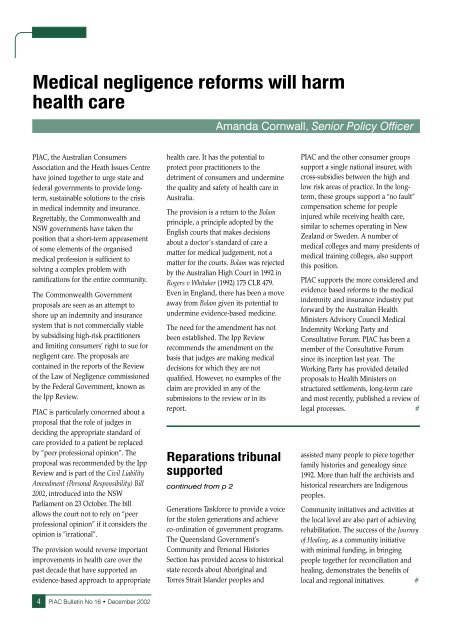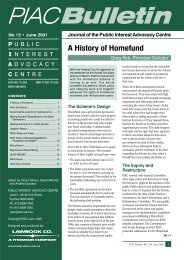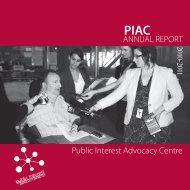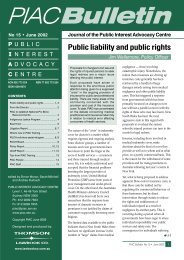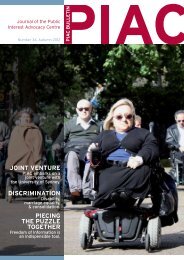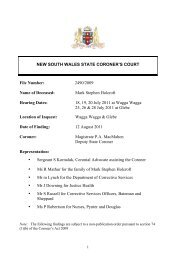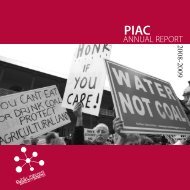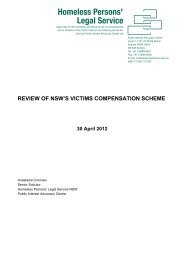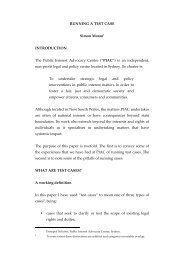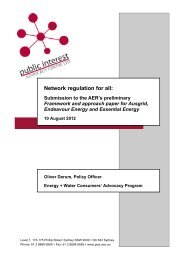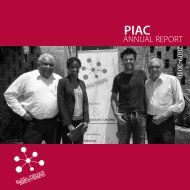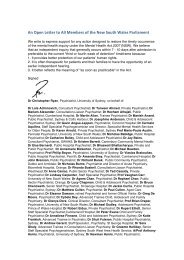PIACBulletin16 - Public Interest Advocacy Centre
PIACBulletin16 - Public Interest Advocacy Centre
PIACBulletin16 - Public Interest Advocacy Centre
Create successful ePaper yourself
Turn your PDF publications into a flip-book with our unique Google optimized e-Paper software.
Medical negligence reforms will harm<br />
health care<br />
Amanda Cornwall, Senior Policy Officer<br />
PIAC, the Australian Consumers<br />
Association and the Heath Issues <strong>Centre</strong><br />
have joined together to urge state and<br />
federal governments to provide longterm,<br />
sustainable solutions to the crisis<br />
in medical indemnity and insurance<br />
Regrettably, the Commonwealth and<br />
NSW governments have taken the<br />
position that a short-term appeasement<br />
of some elements of the organised<br />
medical profession is sufficient to<br />
solving a complex problem with<br />
ramifications for the entire community<br />
The Commonwealth Government<br />
proposals are seen as an attempt to<br />
shore up an indemnity and insurance<br />
system that is not commercially viable<br />
by subsidising high-risk practitioners<br />
and limiting consumers’ right to sue for<br />
negligent care The proposals are<br />
contained in the reports of the Review<br />
of the Law of Negligence commissioned<br />
by the Federal Government, known as<br />
the Ipp Review<br />
PIAC is particularly concerned about a<br />
proposal that the role of judges in<br />
deciding the appropriate standard of<br />
care provided to a patient be replaced<br />
by “peer professional opinion” The<br />
proposal was recommended by the Ipp<br />
Review and is part of the Civil Liability<br />
Amendment (Personal Responsibility) Bill<br />
2002, introduced into the NSW<br />
Parliament on 23 October The bill<br />
allows the court not to rely on “peer<br />
professional opinion” if it considers the<br />
opinion is ”irrational”<br />
The provision would reverse important<br />
improvements in health care over the<br />
past decade that have supported an<br />
evidence-based approach to appropriate<br />
health care It has the potential to<br />
protect poor practitioners to the<br />
detriment of consumers and undermine<br />
the quality and safety of health care in<br />
Australia<br />
The provision is a return to the Bolam<br />
principle, a principle adopted by the<br />
English courts that makes decisions<br />
about a doctor’s standard of care a<br />
matter for medical judgement, not a<br />
matter for the courts Bolam was rejected<br />
by the Australian High Court in 1992 in<br />
Rogers v Whitaker (1992) 175 CLR 479<br />
Even in England, there has been a move<br />
away from Bolam given its potential to<br />
undermine evidence-based medicine<br />
The need for the amendment has not<br />
been established The Ipp Review<br />
recommends the amendment on the<br />
basis that judges are making medical<br />
decisions for which they are not<br />
qualified However, no examples of the<br />
claim are provided in any of the<br />
submissions to the review or in its<br />
report<br />
Reparations tribunal<br />
supported<br />
continued from p 2<br />
Generations Taskforce to provide a voice<br />
for the stolen generations and achieve<br />
co-ordination of government programs<br />
The Queensland Government’s<br />
Community and Personal Histories<br />
Section has provided access to historical<br />
state records about Aboriginal and<br />
Torres Strait Islander peoples and<br />
PIAC and the other consumer groups<br />
support a single national insurer, with<br />
cross-subsidies between the high and<br />
low risk areas of practice In the longterm,<br />
these groups support a “no fault”<br />
compensation scheme for people<br />
injured while receiving health care,<br />
similar to schemes operating in New<br />
Zealand or Sweden A number of<br />
medical colleges and many presidents of<br />
medical training colleges, also support<br />
this position<br />
PIAC supports the more considered and<br />
evidence based reforms to the medical<br />
indemnity and insurance industry put<br />
forward by the Australian Health<br />
Ministers Advisory Council Medical<br />
Indemnity Working Party and<br />
Consultative Forum PIAC has been a<br />
member of the Consultative Forum<br />
since its inception last year The<br />
Working Party has provided detailed<br />
proposals to Health Ministers on<br />
structured settlements, long-term care<br />
and most recently, published a review of<br />
legal processes #<br />
assisted many people to piece together<br />
family histories and genealogy since<br />
1992 More than half the archivists and<br />
historical researchers are Indigenous<br />
peoples<br />
Community initiatives and activities at<br />
the local level are also part of achieving<br />
rehabilitation The success of the Journey<br />
of Healing, as a community initiative<br />
with minimal funding, in bringing<br />
people together for reconciliation and<br />
healing, demonstrates the benefits of<br />
local and regional initiatives #<br />
4 PIAC Bulletin No 16 • December 2002


